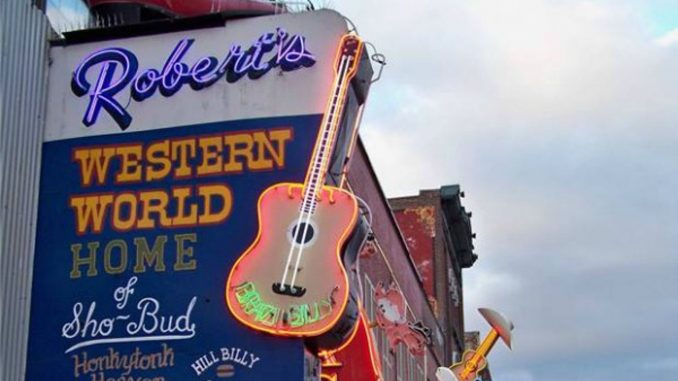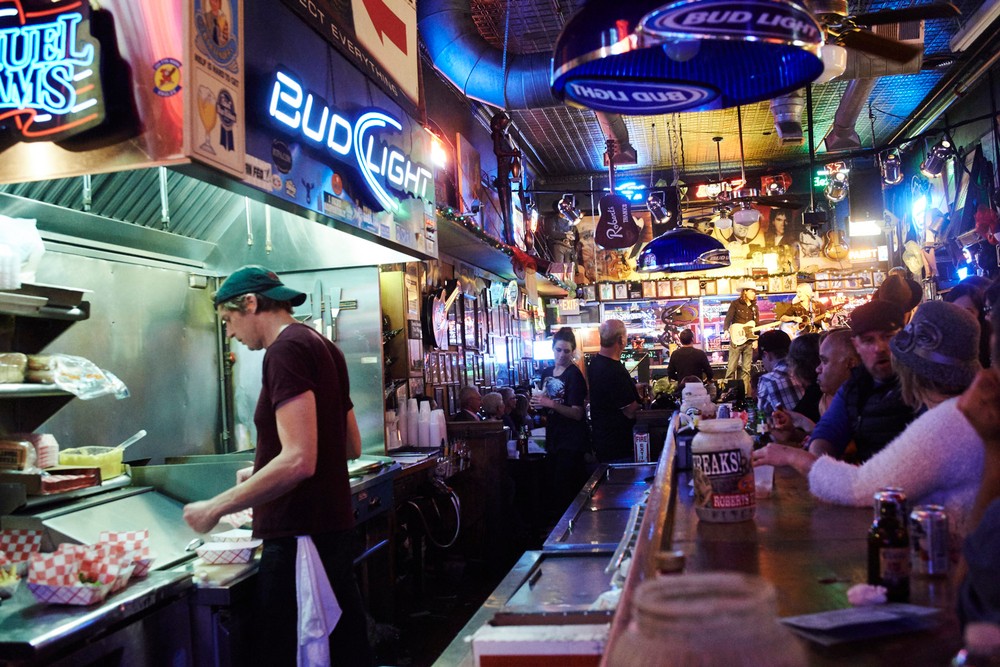
There are many wonderful venues in Nashville; the Ryman Auditorium, the Bluebird Café, the Opry itself, but perhaps one of the most unusual, and largely unsung, is Robert’s Western World.
Robert’s Western World is a honky-tonk bar, and so much more, located on Broadway in downtown Nashville, Tennessee. The exact origins of this building are unknown but the buildings in this historic part of Nashville are steeped in history, with some of them serving as hospitals during the days of the American Civil War. In more recent times, the building that is now Robert’s has been a warehouse and office space for river merchants, along with a variety of other uses.
In the early 1950s, steel player Shot Jackson was putting string-pullers with pedals on Fender, Rickenbacker, and other steel guitars. He saw the potential for building pedal steel instruments and approached fellow steel player, Bud Isaacs, with the idea that they start a company, called Sho-Bud, to manufacture pedal steel guitars. Bud Isaacs turned the offer down so Jackson, rather than ditch what he felt was a great name for his fledgling company, made his offer to another steel player, the great Buddy Emmons – and the Sho-Bud company was formed in 1955. The building that is now home to Robert’s Western World became the home of the Sho-Bud Steel Guitar Company and served as their HQ from the late fifties through to the early 1980s. They would also go on to build acoustic guitars in the 70s and even a range of resonator guitars, in conjunction with Gretsch, called the Sho-bro (a play on the recognised resonator guitar, a Dobro). During this time they would build a range of custom instruments for artists as diverse as the likes of The Monkees, Yes and Poco! Emmons left the company in 1963 to set up his own pedal steel production company, but Sho-Bud rolled on throughout the golden era of country music into the early 1980s.
As the interest in classic country music waned, the lower Broadway area came on hard times. The Grand Ole Opry had moved out of the Ryman Auditorium and relocated to the Gaylord Complex at Opryland U.S.A. This was a hard blow to the downtown area, whose merchants and shop owners had relied heavily on the fans, tourists, and music industry personnel who came to the area for the Opry. What had been the heart of country music in Nashville, for both the stars and the fans, was now a centre for adult bookstores, peep shows, and rundown honky-tonks. The home of Sho-Bud Steel Guitars suffered along with the rest of the area; Sho-Bud moved out and Lynn’s Liquor Store moved in to replace it!
Thankfully, country music slowly started to re-establish itself after the downturn of the ’80s and the heart of Nashville started to beat again, with many businesses returning to the Broadway area. In the early 90s, Robert Wayne Moore bought the building and replaced Lynn’s Liquor Store with Rhinestone Western Wear, a western boot and apparel store. Robert Moore had an entrepreneurial spirit and, having run a honky-tonk bar in the past, saw the advantages of diversifying his business, adding a bar and a jukebox in his store to help entice customers in. This proved to be so popular that he soon replaced the jukebox with live music and added a basic kitchen to the bar area – now you could enjoy a sandwich, a beer and a live singer while you tried on your boots! In 1992 Moore changed the name of his store from ‘Rhinestone Western Wear’ to ‘Robert’s 3 Doors Down’ (Moore had once owned a bar and club called Tootsie’s, located three store’s further up the street to his Western Apparel store) and then to Robert’s Western Wear Bar & Night Club. Finally, it became Robert’s Western World.

It’s probably true to say that the band that did the most to put Robert’s on the map, as a Nashville venue of note, was BR5-49. In 1993, Gary Bennett was already fronting an informal band that would, occasionally, play for tips at Roberts, when he met Chuck Mead at another Nashville bar. Mead had been playing in a roots/rock outfit called Homestead Grays, in his hometown of Lawrence, Kansas but had moved to Nashville in search of better opportunities. He and Bennett found a natural rapport and decided to form a band of their own. The band name came from a car salesman comedy routine by American comedian Junior Samples and the full band line up was Mead and Bennett on guitar and vocals, multi-instrumentalist Don Herron, drummer “Hawk” Shaw Wilson, and upright bass player, “Smilin’” Jay McDowell (the first bass player, on electric bass guitar, was Jim “Bones” Becker, but he never recorded with the band). They quickly took up residency at Robert’s and were soon recognised as the house band. They had a style rooted in Rockabilly and Western Swing that was both traditional and right up to the minute; a good time band that was completely at home in the raucous atmosphere of Robert’s. In 1995 they were signed to Arista and their first release was the now legendary “Live From Roberts”, an extended play cd of eight tracks, mixing covers with the band’s own material. They released two more albums on Arista before the label dropped them in 2000. They re-emerged on Lucky Dog Records a year later, having dropped the hyphen from their name, and would record three albums as BR549 before calling it a day in 2006, though Bennett and McDowell left in 2002. The original recording lineup re-united in 2012 and have played together occasionally since then. There is a Facebook page that is currently active, though no sign of any band activity.
BR5-49 moved on from Robert’s to bigger things and were replaced as house band by Latin rockabilly outfit, Brazilbilly, fronted by Brazilian musician Jesse Lee Jones. In 1999 Robert Moore would finally sell Robert’s to Jesse Lee Jones. Jones has always said it’s his intention to preserve Robert’s as “the home of traditional country music on lower Broadway” and he’s gone out of his way to ensure Robert’s remains much as it always has. Brazilbilly still plays Robert’s two nights a week, though other bands have established themselves as regulars at this venue, most notably the Don Kelley Band, who have also called the place home for the best part of twenty-five years.
After many ups and downs, Broadway has re-established itself at the heart of Nashville and, though there are many other venues throughout the city these days, and competition is fiercer than its ever been, Robert’s is still there, showcasing traditional country talent, in all its flavours, while continuing to sell beer and their famous fried bologna sandwiches – and you can still buy your cowboy boots there!



I’m sure we saw a “Brazilbilly” style band at this place when we visited Nashville in early 2019.
Quite likely Paul; they’d been playing off and on at the place for some years before Jesse Lee Jones bought the place in 1999. I’m not sure exactly when they replaced BR5-49 as one of the house bands but it would’ve been well before 1999. BR5-49 started touring in support of some quite big artists once “Live at Robert’s” was released so they wouldn’t have been house band for much longer.
Had three days in Nashville on a road trip back in 2016 and visited Robert’s Western World a number of time. A fantastic venue with some cracking bands, including a fabulous group playing western swing. The fact that it’s so close to Tootsie’s as well, makes it a perfect venue for a night of honky-tonking.